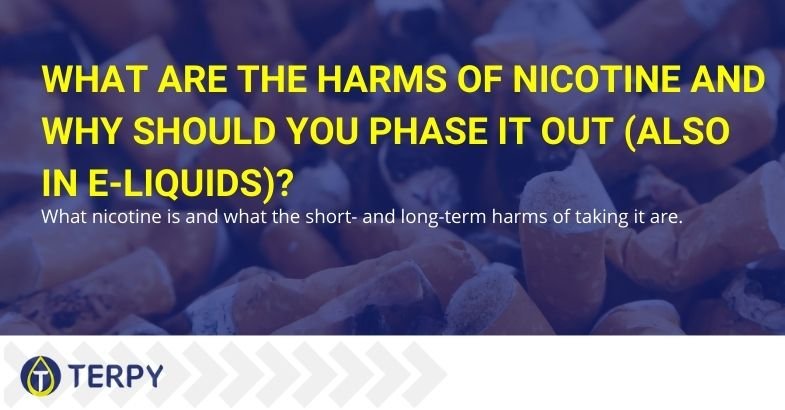Modified on: 16/05/2022
What nicotine is and what the short- and long-term harms of taking it are
If you are a smoker and you are thinking of switching to an electronic cigarette, or if you want to try to convince a loved one to stop smoking, you will certainly need to know what the harm of nicotine is and what it is in detail.
The damage caused by burning cigarettes through the inhalation of some 4000 toxic substances (over 400 of which are carcinogenic) is well known… But few people talk about the consequences of nicotine alone, which is also present in e-cigarette liquids.
First, it should be stated that vape liquids help you to avoid withdrawal and a relapse into smoking. Moreover, they have quantities of nicotine that can be adjusted and gradually reduced – right down to zero! -On the opposite, with a traditional cigarette, you cannot eliminate this substance because it is naturally present in tobacco.
Today we want to go into more detail about what nicotine is and what its short- and long-term effects are, so that you can be 100% aware of the harm of this substance and, hopefully, makes you want to quit smoking (or help someone else to do so) as soon as possible!
Nicotine: what it is in detail
Nicotine is a plant-based (but synthetically reproducible) alkaloid found in various types of plants, including tobacco and other solanaceous plants.
Taken in small quantities, it is a stimulating, psychoactive, addictive substance… But you have to be very careful about concentrations, because it is a highly toxic compound for humans, even deadly when it reaches a dosage of between 30 and 60 mg.
Yes, nicotine is a poison if the quantity is exceeded – although with cigarettes it is very difficult to reach very serious consequences such as death. In fact, a single cigarette contains concentrations of between 1 and 1.5 mg of nicotine, of which the body takes up around 90% and gradually eliminates.
Although death from nicotine intoxication is an unlikely event with smoking alone, the damage of nicotine intake is still tangible.


How does nicotine work and what are its immediate effects?
Taking nicotine causes a sudden release of dopamine into the pleasure and motivation areas of the brain (an effect very similar to taking heroin).
As you may know, dopamine is the neurotransmitter responsible for reinforcing survival-related behaviour, motivation and reward mechanisms.
The immediate consequences of increased dopamine levels are a strong feeling of euphoria and pleasure, reduced anxiety and increased concentration… But, in addition to these positive effects, there is also a very serious effect: taking a substance that increases dopamine establishes behavioural reinforcement, which is the basis of self-administration of substances of abuse.
It will not surprise you to learn that nicotine causes:
- Addiction, resulting in withdrawal when not taking it. Symptoms of nicotine withdrawal include high anxiety, uncontrollable desire to take the drug, feeling lost, lack of concentration, irritability and more.
- Addiction. Yes, nicotine is addictive, making users tolerant to its effects, which means that users require higher and higher doses to enjoy the same sensations.
That’s not all: the side effects of its intake affect many of our organs and systems, particularly the brain, heart, respiratory system and many others.
Read also: Electronic cigarette atomizer operation (quick and easy guide)
What is the damage of nicotine to the cardiovascular system?
The intake of this particular alkaloid has extremely dangerous (some fatal) consequences for our cardiovascular system. These are as follows
- Dilation of the aorta (aneurysm), a life-threatening consequence. With the intake of nicotine, the aorta progressively and permanently dilates; at the same time, its walls become thinner to the point of rupture.
- Serious pharmacological effects, such as an increase in heart rate, the rate at which the heart consumes oxygen and the volume of heartbeats.
- Excessive coagulation of the blood, thus increasing the risk of thrombosis.
- Atherosclerosis, which causes fat and white blood cells to deposit on the walls of the arteries. The consequences are an increased risk of angina pectoris, heart attack and stroke.
- Hypertension.
We now turn to the side effects on the brain.
Negative effects of nicotine on the brain
The consequences of nicotine on the brain tend to be acute (i.e. short-term) and include:
- Momentary dizziness and lightheadedness
- Sleep disturbances
- Nightmares
Nicotine intake also adversely affects the gastrointestinal system, causing acute and chronic effects.
Nicotine damages to the gastrointestinal system, leading to the following short-term effects:
- Nausea
- Vomiting
- Dry mouth (Xerostomia)
- Diarrhoea
- Heartburn
- Digestion problems
Long-term problems include the development of peptic ulcers, also known as stomach ulcers.


In addition to the effects on the brain and the cardiovascular and gastrointestinal systems, we must consider the serious consequences of nicotine use during pregnancy.
What are the harms of nicotine use during pregnancy?
The repercussions of cigarette smoking and, more specifically, of nicotine during pregnancy are extremely critical, as they greatly increase the chances of the child developing major chronic diseases.
Specifically, here are the diseases that a person whose mother smoked during pregnancy could develop (in childhood, adolescence or adulthood):
- hypertension (high blood pressure)
- type 2 diabetes
- respiratory diseases
- obesity
- brain development problems
- infertility
- behavioural problems
And much more.
Read also: What vaping is and why it’s the best way to quit smoking
In conclusion
Now that you know what the harm of nicotine is, both acute and chronic, let’s assume that you want to quit smoking or convince a loved one to do so.
However, addiction to this substance makes quitting cigarettes extremely difficult: it seems that nicotine is at least as difficult to quit as heroin!
In order to stop smoking without relapsing into smoking, it is necessary to:
- compensate for the intake of this alkaloid so as not to experience withdrawal
- gradually and smoothly lower the milligrams of nicotine consumed during the day
The e-cigarette was developed with this in mind, to enable people to quit smoking without falling back on a traditional cigarette at the slightest hint of withdrawal. E-cigarette liquids with nicotine have adjustable amounts of nicotine and allow the nicotine intake to be progressively reduced when the user feels ready.
It is no coincidence that using an e-cig is regarded as the best way to stop smoking (for good).
What are you waiting for?
Buy your first electronic cigarette and your first liquids on Terpy.shop now and keep following our blog to receive information and advice, always up to date, on the world of vaping!





